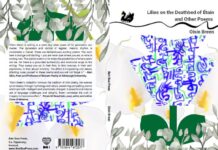Book Review by Anjana Basu
The Matrix of Memory
Coming almost on the heels of Knotted Grief, Mother Muse Quintet follows a similar path paved with shards of memory and loss. Naveen Kishore explores the loss of his mother who guided the poet through childhood into the adult world in different ways, even though she was not there for the full length of his growth journey. Divided into five – the quintet with its jazz echoes – the poetry moves slowly through the world of reminiscence and tactile sensation.
Short and long lines are carefully balanced in Kishore’s poetry – though there are fewer haiku here than in the previous collection. They are succinct in their conceptualization; two words can and frequently do make a line, yet they nevertheless spin out the problems in the minds of readers. The poems’ images of emptiness are heightened by the pages’ white/blank spaces, contrasting the poems’ simple design with their sense of loss and the blanks of memory.
The sun.
In a boat. Being ferried
to the other side. Bearing light.
Bearing Light.
The question is who is this muse? Mother India, Mother Kashmir – Kashmir is mentioned with the child in the mother’s lap – or the poet’s own mother? A mother who left memories behind while forgetting her own, leaving them scattered like crumbs to help her son find his way through a haunted forest. “You gifted me my memory. We did not know then that one day you would lose yours.” The poet’s mother is the symbol of the world mother.
Picture this. The child of two. Three and four. Dodging
her legs. Adept. Agile. Adroit
These are emotional shards that pierce the reader’s consciousness as they directly hit the unsettled areas of the soul. Symbolism projects the poet’s message acquiring greater strength through repetition because the quintet is an exploration through memories and remembrances, a response to his mother’s plea “Build me a self. She pleaded”.
The poems are the poet’s attempt to give a form to his once vibrant mother and reshape her as she was through the cosmos of imagination, the pulse beneath the poetry. Her elusive presence envelops itself in the poet’s nuanced explorations of memory. It floats like the fog that envelops the spectral presences throughout this poem – the Mother Muse embodies herself in a language that is very often cryptic, cresting waves of emotion, rising and falling but never still in the way that the ripples of memory rarely allows the mind to rest.
You walk through the door. Into a fog.
The grey of a winter morning making its home on your
side of the threshold. You wander. Feel the damp on your
arms.
The poet explores the different aspects of memory from childhood to growing up each a part of something his mother contributed to. There are tactile memories of her presence, of sitting in her lap, cutting mango pulp with a knife or in the sensory realm, the sound of her voice as she requests him to sing. Or there are the times when she reenacted scenes from her father’s screenplays for her son evoking the physical memory out of the verse and her son invokes her…
“In my mind, the sari she wore is always a pale pink. Almost ivory. And a chiffon. Let us give her a name, shall we? Mother.” Just one memory that evokes the presence of a gentle person draped in grace, though nothing more.
Ironically that once elephantine memory has fled leaving the son’s mind filled with recollections of the fragility of life and relationships that he cannot share with her because they have come to mean nothing to his muse.
“…my retelling of the ‘tales’ you told me. ‘Making up’ what had slipped past me. I gave them the happy endings you never had.”
There are references to folk tales and hints of political undercurrents, of other mothers bereft of their children through unfortunate circumstances. At times the effect is eerie heightened by the fog that seems to obfuscate the narrative wrapping it around in a close embrace. The images cut across time and place since they could belong anywhere. Occasionally one is reminded of Wuthering Heights with the shape of a mother’s shrouded form outside the window cradling new born dreams in her arms asking for entry.
Each image adds inspiration to the exploration of memory and gives rise to more. On her birthday he gifted her mirror she never used but it remained to reflect her memory and awaken that of her son – his inheritance from her. The emotion of memory recollected in tranquillity amongst the chaos caused by her departure.
An extract – a poem – from the quintet:
She carried crumbs. Every single morning. The smell of
bread. Every single morning. For as long as I can
remember. For as long as she can remember. She never
forgot to scatter the crumbs. In every conversation. Like
puzzles. Or clues. To help her find her way home. Later.
Much later. When the mist from over there would begin
to rise. Stretch out. Start to take charge. Like the inevitable
damp. Cling to things. In and around her. Then, those scat-
tered clues. Like markers in a treasure hunt. Those planted
hints. They were the advance guard. In a war that would
surely take place. But in her innocence she had failed.
To realize. That the first casualty would be the power
lines. Short-circuited. The enemy would cut off her ability
to recognize. To recall her masterplan. To recognize the
very signs she had so diligently left in place. Now they
were part of a geography lesson. A map of an alien
landscape. Of her own making.

(Mother Muse Quintet – Naveen Kishore – Speaking Tiger – INR399.00)
About the Reviewer
Anjana Basu is a noted novelist, poet, reviewer and travel writer.
















